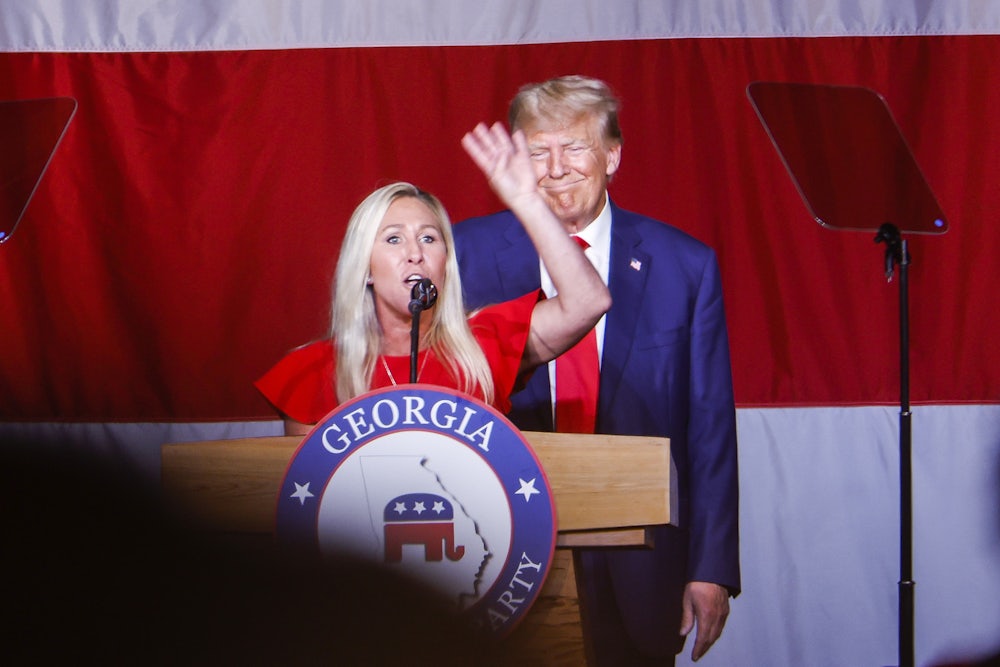The Colorado Supreme Court, in a bombshell 4–3 decision on Tuesday, ruled that the Fourteenth Amendment disqualifies Donald Trump from running for president again because of his engagement in the January 6, 2021, insurrection. There are complaints from MAGAland. But of course he engaged in insurrection against the United States—for God’s sake, we all watched it on TV! And then we learned, in rich detail from the House January 6 committee and witnesses like Cassidy Hutchinson, all the ways in which he cheered the violence on.
Here’s Hutchinson in her book: “I take a few steps back as Mark [Meadows] takes my place in the doorway and strain to listen to both conversations. The TV in the Oval dining room is blaring, and the president is yelling. What’s he saying? I can’t make it out. I hear him say ‘hang’ repeatedly. Hang? What’s that about? Mark hands his phone back to me, the cue for me to return to my desk.”
Yes, yes, that’s not corroborated anywhere else. Maybe Meadows knows. But Hutchinson said a lot of explosive things, describing acts to which there were other witnesses (Trump grabbing for the steering wheel in the Beast), and she has not been credibly challenged by anyone. Indeed, on the point of the steering wheel incident, she did initially lie to the committee, feeling pressured by her lawyer to deny that she remembered Trump doing that. She later admitted that she lied and told the whole story.
That we even have to debate these things is in some sense ridiculous. The Colorado Supreme Court felt compelled to spend 18 long pages (starting on page 69, if you’re interested) arguing three points that, to any sane and reasonable person, are obvious: (1) the presidency is an office under the United States, (2) the president is an officer of the United States, (3) the presidential oath is an oath to support the Constitution. Well, that’s the law for you. But at least the decision shreds Trump’s lawyers’ arguments.
And I should quickly note this crucial point. Critics of the Colorado decision will argue that judges in three other states have tossed similar suits. That is true, but so is this: Not one of the suits was dismissed on substantive grounds. In Minnesota, the state Supreme Court decided merely that a winner of a state party primary is not definitionally a presidential nominee and that, in any case, there is no state law barring a Minnesota political party from nominating an ineligible candidate. In the other three states—Florida, New Hampshire, and Rhode Island—judges found that the plaintiffs lacked standing (handy litigation tracker here).
In other words, the only set of judges in this country that has thus far taken up the substance of the matter has determined that (1) Trump as an ex-president is included within the language of the Fourteenth Amendment, and (2) he did engage in insurrection.
That both of these assertions are true is, again, obvious. We’ll see what the U.S. Supreme Court thinks. But in the meantime, one question that is dancing around in my mind right now is this: Why stop with Trump?
There are other officeholders, in Congress and at the state level, who are alleged or known to have participated in the planning of January 6. Should they not receive the same scrutiny as Trump?
Back in October 2021, Rolling Stone published a blockbuster report alleging direct involvement in the planning of the insurrection by six Republican members of Congress: Marjorie Taylor Greene, Lauren Boebert, Paul Gosar, Mo Brooks, Louie Gohmert, and Madison Cawthorn (Gohmert and Cawthorn are no longer serving, if you can describe what the other four are perpetrating as “service”).
Reporter Hunter Walker spoke extensively with two sources who alleged to him that these members “were intimately involved in planning both Trump’s efforts to overturn his election loss and the Jan. 6 events that turned violent.”
Beyond this report, we know of many other allegations of conniving with the White House in the run-up to the riot by other House members—Scott Perry, Jim Jordan, and even Mike Johnson, the man who is now the speaker and second in line to the presidency. All we know about Johnson right now is that he organized an amicus brief, signed by many GOP members of Congress, to some bogus election fraud lawsuit. But what else might he have done?
The word “conspiracy” has been used many times—but I don’t think promiscuously—with respect to what happened on January 6, 2021. A conspiracy by definition involves a lot of people. If these or other Republican House members conspired just to have Congress vote against the certification of Joe Biden as president, would that rise to the level of engaging in “insurrection or rebellion,” to use the amendment’s language? Maybe, maybe not. But if they encouraged violence as a means of pressuring members to vote that way? It would seem pretty hard to deny that that would count as insurrection or rebellion.
Bottom line: As exhaustively as that day has been investigated and studied, there is still a lot we don’t know, for the simple reason that the vast majority of the people involved have something to hide and have refused to speak about it. So we might never know the whole story. But we should never forget that what happened on January 6 may have been orchestrated by one man, but, well, it took a village. And even if the Supreme Court surprises us and sets in motion a series of events by which we manage to rid ourselves of Trump, the village will still be full of idiots—and worse.






